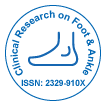当社グループは 3,000 以上の世界的なカンファレンスシリーズ 米国、ヨーロッパ、世界中で毎年イベントが開催されます。 1,000 のより科学的な学会からの支援を受けたアジア および 700 以上の オープン アクセスを発行ジャーナルには 50,000 人以上の著名人が掲載されており、科学者が編集委員として名高い
。オープンアクセスジャーナルはより多くの読者と引用を獲得
700 ジャーナル と 15,000,000 人の読者 各ジャーナルは 25,000 人以上の読者を獲得
インデックス付き
- Google スカラー
- シェルパ・ロミオ
- Jゲートを開く
- アカデミックキー
- レフシーク
- ハムダード大学
- エブスコ アリゾナ州
- OCLC-WorldCat
- パブロン
- ジュネーブ医学教育研究財団
- ユーロパブ
- ICMJE
役立つリンク
オープンアクセスジャーナル
このページをシェアする
抽象的な
A Multi-Center Pilot Study to Evaluate the Efficacy and Safety of NonDimethyl Sulfoxide (Non-Dmso) Viable Umbilical Cord Graft on Diabetic Foot Ulcers
Robert Fridman*, Chengcheng Tu and Joseph Larson
Diabetic Foot Ulcers (DFUs) are one of the main reasons for diabetes-related hospitalizations, all the while creating an economic burden on the healthcare system and considerably impairing quality of life. In cases where a wound fails to decrease in size by 50% within 4 weeks with standard-of-care, it may be appropriate to initiate advanced levels of care to attempt to close the wound and limit complications. Use of amnion/chorion-based skin substitutes that have been cryopreserved and contain viable cells have been shown to achieve full wound closure with less treatments and in less time. Currently, the standard for cryopreservation of mesenchymal stem cells (MSCs) is done with dimethyl sulfoxide (DMSO), which is easily permeable and able to protect MSCs from cryo-injuries. However, DMSO has been shown to have deleterious effects on the viability of cells and tissue, and has adverse effects in humans. Therefore, there is a growing effort to develop DMSO-free cryoprotectants. This pilot study is being presented to study the effects and safety of non-dimethyl sulfoxide (NonDMSO) viable umbilical cord graft (UCG) on DFUs. 25 patients were screened for the study, with 15 patients completing the trial. 6/15 (40%) had complete closure prior to or at the study endpoint. Of the patients whose ulcers did not close by Week-12 (9/15 patients, 60%), eight patients had a 50% or greater improvement by Week-12 (88.8%), and five of those ulcers (55.5%) had a closure rate 90% or greater by week 12. Among the entire cohort, fourteen patients (93.3%) had 50% or greater wound reduction by Week-12, and eleven patients (73.3%) patients had 90% or greater wound reduction by Week-12. Only one patient had 2 applications of graft; the remaining 14 had one application only. Further studies need to be designed to compare DMSO vs. Non-DMSO UCG effectiveness in slow-to-heal DFUs. However, based on our findings, non-DMSO viable umbilical cord graft is an effective way to treat challenging DFUs

 English
English  Spanish
Spanish  Chinese
Chinese  Russian
Russian  German
German  French
French  Portuguese
Portuguese  Hindi
Hindi